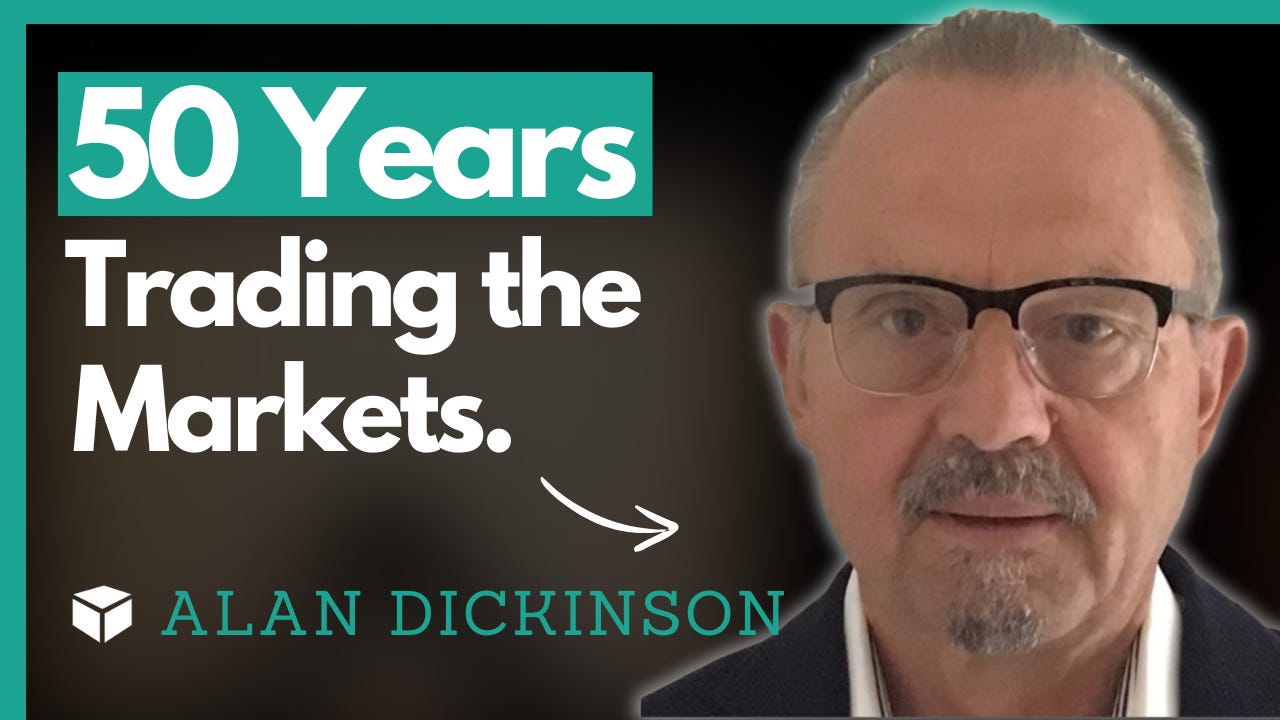5 Lessons From a Futures Trading Legend
How to survive and thrive in trading for the long term
Welcome back!!
Last week I had the privilege of sitting down with Alan Dickinson.
From becoming the first individual to buy his seat at the London International Financial Futures Exchange as a pit trader, to running one of Europe's largest prop trading firms, Alan has truly spent his life in the markets.
He has had massive success as trader and has also helped hundreds of traders to be successful.
These are my notes and reflections from the interview and the advice that resonated with me.
Hope it helps you along your journey.
Develop an Edge and Play to Your Strengths
Successful trading is not about guessing; it’s about developing a repeatable edge.
Alan emphasizes that traders who lack an edge are gambling, not trading.
Your edge can be rooted in technical analysis, fundamental research, order flow analysis, or event-driven strategies—but it must be based on data, probability, and risk management.
We also discussed the importance of finding an asset class that suits your personality.
Commodities is fast-paced, volatile and has its own drivers as a market, if that sounds like you, maybe it’s a good place to start.
If you hate the sound of that, then maybe it’s not.
This is an interesting point that’s rarely discussed but definitely worth considering.
Risk Management: The Key to Survival
Alan has seen countless traders blow up because they didn't manage risk.
"A 20k account for an independent trader is infinitely more stressful than a bank’s 20m position,"
Why?
Because when you’re trading you’re own money on a smaller account, risk tends to be bigger if you’re trying to make some money from it and it’s YOUR money.
This is a key difference I’ve come to appreciate.
Buying an online funded challenge and trading those funds may not be emotionally the same experience as trading your own funds.
So be mindful if that’s in your future plans.
Alan also shared the eternal trading advice: Cut your losses quickly.
This is a non-negotiable in becoming a successful trader.
Not only that, but be mindful of your winners too.
If you’re on a hot winning streak, psychologically you may be holding onto those winners and trying to create them.
Create some space, let go, take a holiday, get back to zero and start again.
Avoid the Fatal Flaws That Kill Traders
Alan has worked with hundreds of traders, and he’s seen many fail due to the same mistakes.
Here’s what NOT to do:
Watching Your P&L Instead of the Market: Focusing on money instead of price action leads to bad decisions.
Overtrading: Chasing the market after missing a move usually results in losses.
Trading on Emotion: Revenge trading after a loss is one of the fastest ways to blow up an account.
Failing to Adapt: Markets change. What worked last year might not work today.
Adapt to Market Conditions: Open Outcry to Electronic Trading
Alan witnessed one of the biggest transformations in trading: the shift from open outcry (pit trading) to electronic trading.
Many traders failed because they refused to adapt.
Developments in the industry can be an opportunity to create a new edge but you can’t always hold onto your past approach and expect it to work:
Embrace Technology: Try new charting methods, backtesting, AI tools to gain insights.
Don’t Get Stuck in Old Ways: What worked yesterday may not work tomorrow.
Alan’s Eternal Trading Advice
"Find your edge, stick to your strengths, and don’t get caught up in the hype."
"The market will always be there tomorrow—don’t feel the need to force trades."
"Price is always right. It’s never out to get you. Learn to respect it."
"If you love this game, you’ll never retire from it. But you must play smart to stay in the game."
By following these principles, traders can navigate markets more effectively, minimize risks, and maximize their potential for long-term success.
Hope you enjoyed this newsletter, see you next week!
(This newsletter is not investment advice, all views are my own.)



